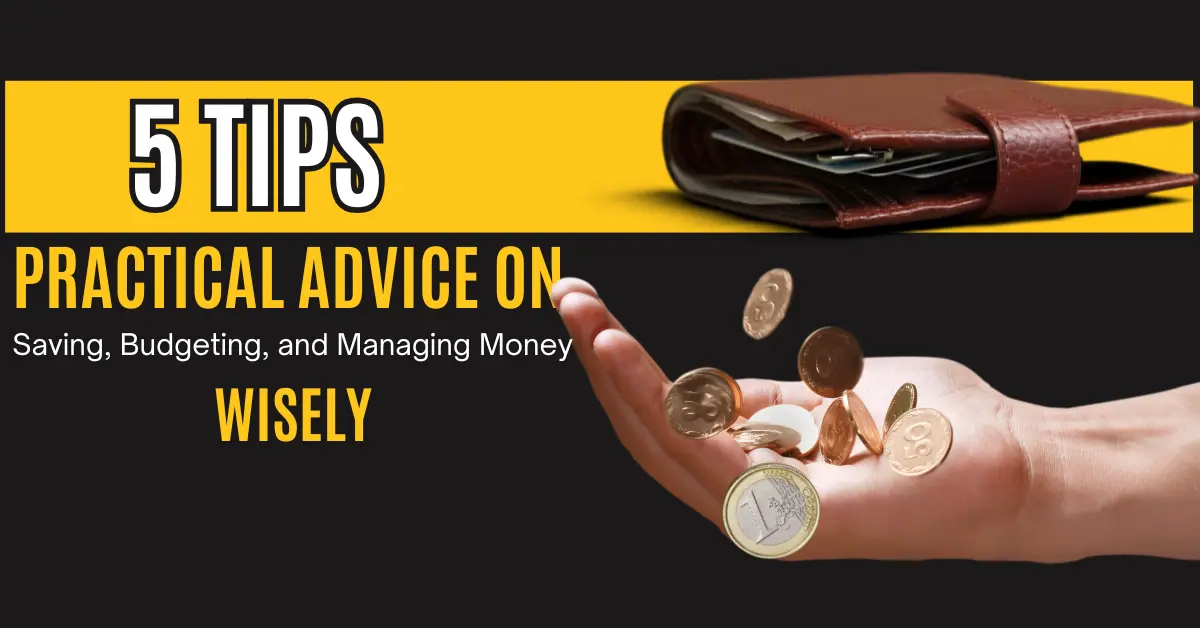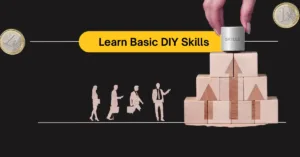
5 Tips: Practical Advice on Saving, Budgeting, and Managing Money Wisely
- 107
- 0
- 0
Saving, budgeting, and managing money wisely are important for financial security and peace of mind. Saving helps you prepare for unexpected expenses and future goals, like buying a home or retirement. Budgeting allows you to track your spending and prioritize needs over wants, preventing debt. Managing money wisely helps you make informed decisions, ensuring you have enough for daily living and emergencies. By practicing these habits, you can reduce financial stress, build wealth over time, and enjoy a stable and secure financial future for yourself and your family.
Practical Advice on Saving, Budgeting, and Managing Money Wisely
Managing your money well is a crucial skill that can help you achieve your goals and reduce stress in your life. In this blog post, we’ll look at five practical advice on saving, budgeting, and managing money wisely. These ideas are easy to understand and put into practice, even if you’re new to personal finance.
Use the Envelope System for Spending Control

The envelope system is a simple but powerful way to manage your spending. Here’s how it works:
- At the start of each month, take out cash for your various expense categories (like groceries, entertainment, etc.).
- Put the cash for each category in a separate envelope.
- Only spend money from the appropriate envelope for each purchase.
- When an envelope is empty, stop spending in that category until next month.
This system helps you:
- See precisely how much funds you have left in each classification
- Avoid overspending, since you can’t spend cash you don’t have
- Make more mindful choices about your purchases
If you don’t want to use actual cash, you can create virtual envelopes using a budgeting app or spreadsheet. The key is to stop spending in a category once you’ve reached your limit for the month.
Remember, it might take a few months to figure out the right amounts for each envelope. Be patient with yourself and adjust as needed.
Try the 30-day Rule for Purchases

The 30-day rule is a great way to cut down on impulse buying and save money. Here’s how it works:
- When you want to buy something that’s not a necessity, write it down along with the date and price.
- Wait 30 days before making the purchase.
- After 30 days, if you still want the item and can afford it, go ahead and buy it.
- If you no longer want it or have decided it’s not worth the money, congratulations – you’ve just saved that amount!
This rule helps you:
- Distinguish between wants and needs
- Avoid buyer’s remorse
- Save money on things you don’t need
- Make more thoughtful purchasing decisions
You might be surprised how often you lose interest in items after waiting for a month. For things you do end up buying, you’ll feel more confident in your decision.
Master the Art of Negotiation

Many people don’t realize how often prices are negotiable. Learning to negotiate can save you money on all sorts of expenses. Here are some tips:
- Do your research. Know the typical price range for what you’re buying.
- Be polite and friendly. People are more likely to work with you if you’re nice.
- Ask if there are any discounts available. There might be specials you don’t know about.
- Be willing to walk away if you can’t get a good deal.
- Practice! The more additional you bargain, the better you’ll get at it.
You can negotiate on things like:
- Rent for an apartment
- Prices at local shops or markets
- Rates for services (like internet or cable TV)
- Medical bills
- Salaries and job benefits
Remember, the worst that can happen is someone says no. You have nothing to lose by asking, and potentially a lot to gain.
Use the “Pay Yourself First” Method

“Pay yourself first” is a powerful savings strategy. The idea is to treat savings as your most important monthly “bill.” Here’s how to do it:
- Decide on a percentage of your income to save each month (start with 10% if you’re not sure).
- As soon as you get paid, move that percentage into a savings account.
- Live on what’s left after you’ve “paid yourself.”
This method ensures that you prioritize saving instead of trying to save what’s left at the end of the month (which is often nothing).
To make this easier:
- Set up automatic transfers from your checking account to your savings account on payday.
- Increase your savings percentage gradually over time.
- Put any “extra” money (like bonuses or tax refunds) directly into savings.
Remember, it might feel tight at first, but you’ll quickly adapt to living on less. And you’ll be building a strong financial foundation for your future.
Learn Basic DIY Skills

Learning to do some things yourself instead of paying others can save you a lot of money over time. Here are some skills worth learning:
- Basic home repairs (fixing a leaky faucet, patching drywall, etc.)
- Simple car maintenance (changing oil, replacing air filters)
- Cooking and meal prep
- Haircuts (for yourself or family members)
- Basic sewing for clothing repairs
- Computer Troubleshooting
You don’t need to become an expert in everything. Just learning a few skills can make a big difference. Plus, being able to fix things yourself is satisfying and can save you time as well as money.
To learn these skills:
- Look for free tutorials online (YouTube is great for this)
- Ask friends or family members to teach you
- Take classes at local community centers or hardware stores
- Start small and gradually take on bigger projects as you gain confidence
Remember, always prioritize safety. If a task seems too complex or dangerous, it’s better to hire a professional.
Wrapping Up
Managing your money doesn’t have to be complicated. These five tips can help you take control of your finances:
- Use the envelope system to control spending
- Apply the 30-day rule to avoid impulse purchases
- Learn to negotiate for better prices
- Pay yourself first to prioritize saving
- Develop basic DIY skills to save on services
Start with one tip that feels most doable for you, and add others as you get comfortable. Remember, little differences can add up to big results over time. The most important thing is to start taking action to improve your financial health.
With practice, these money management skills will become habits, helping you build a more secure financial future. Keep learning, stay patient with yourself, and celebrate your progress along the way.
FAQs
1. Why is saving money important?
Answer: Saving money is important because it helps you prepare for emergencies and future goals. It provides a safety net for unexpected expenses and allows you to plan for things like vacations or buying a home.
2. How do I create a budget?
Answer: To create a budget, list your income and expenses. Track where your money goes each month. Set limits for each category, like groceries or entertainment, to ensure you don’t overspend and stay within your means.
3. What are some tips for effective saving?
Answer: Start by saving a small amount regularly, like a portion of your paycheck. Use savings accounts with interest, set specific goals, and automate your savings to make it easier to reach your financial targets.
4. How can I reduce unnecessary expenses?
Answer: To reduce unnecessary expenses, review your spending habits. Identify areas where you can cut back, like dining out or subscription services. Look for discounts, buy in bulk, and plan meals to save money.
5. What is the dissimilarity between needs and wants?
Answer: Needs are essentials for living, like food, shelter, and healthcare. Wants are things you desire but can live without, like luxury items or entertainment. Understanding the difference helps prioritize your spending and budgeting.
Also Read:
How to Make Money Online in India for Students
Financial Outlook: Key Insights from India’s Budget 2024
References:
https://pmc.ncbi.nlm.nih.gov/articles/PMC10645357/
https://www.researchgate.net/publication/373599479_Student_Practice_Handling_Personal_Finances
https://en.wikipedia.org/wiki/Budget
Disclaimer: The financial tips provided are for general informational purposes only and should not be considered as personalized advice. Always consult a professional financial advisor before making any decisions related to saving, budgeting, or investing.
Related post



